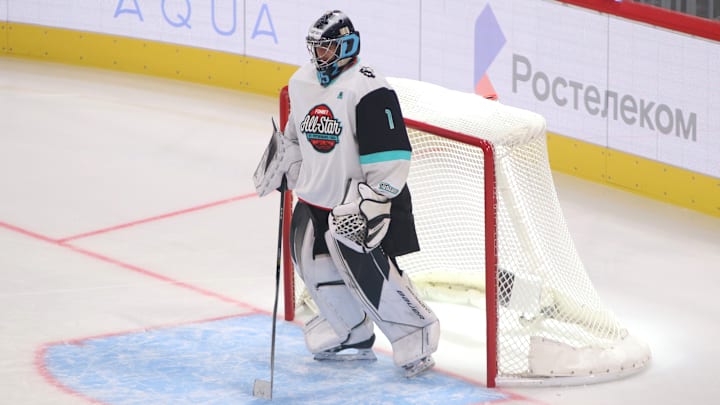The treatment of overseas players is a delicate thing. Teams have to make sure that players have a certain level of comfortability. Yes, these professionals make more money than most can dream of, but this is still a delicate process that can go haywire instantly.
It sounds like that happened in Lehigh Valley, the AHL city for the Philadelphia Flyers. The Flyers signed Belarusian goalie Alexei Kolosov to a three-year contract last offseason, with plans to send him to the NHL for development. The former third-round pick had high hopes, and the Flyers were hoping they could find a backup for Carter Hart (oh, how things have changed).
According to reporting by Philadelphia Hockey Now’s Jon Bailey (who also contributes to Pucks and Pitchforks), the Flyers are unsure if Kolosov is going to return next season. It sounds like the way he was treated while in Lehigh Valley could be a main reason why.
"Inside the AHL‘s Tony Androckitis reported Saturday morning that a source claimed, "(The Flyers) put him in the hotel by himself and he felt isolated, especially since his English isn’t great.” Keep in mind that Kolosov, drafted 78th overall by the Flyers in the 2021 NHL Draft, has spent his entire career in Belarus up to this point and was not paired up with or surrounded by anyone who he could communicate with at a meaningful level."Jon Bailey, Philadelphia Hockey Now
The Devils selected Mikhail Yegorov 49th overall in this year's NHL Draft. The goalie has a very different experience than Kolosov, leaving Russia last year to join the USHL. Some prospects do that before the draft to get experience in the North American style of play.
Yegorov did not have an easy time in the US, playing for the Omaha Lancers. He's faced 30 shots 21 different times this season as he works to get used to a new style. There has to be frustration involved. Also, we can't think the amenities in the USHL are that great. They are one of the lesser leagues, and the money is much less than the AHL. However, plenty of overseas players have faced worse and made it to the NHL.
Yegorov is committed to Boston University in 2025, and he will play one more season in the USHL next season. Luckily for the Devils, NCAA amenities for athletes tend to be amazing. The Devils have to make sure they at least match those amenities if he’s forced to start his career in the AHL.
Yegorov is just a different prospect than Kolosov, but the Devils and the rest of the NHL should still learn a lesson here. It could easily turn off future Russian and other overseas players if they were treated like Kolosov. It is not smart to isolate players. While it might sound like a nice vacation to spend a few weeks in a hotel, playing in a small city (which most of these AHL cities are), and feeling a certain level of isolation.
We have to remember, these players are separated from their families and friends, playing with a whole new set of teammates, most of which don’t even speak the same language. They are bombarded with new material to study, and sometimes they are immediately expected to perform.
The Devils have been known as a player-friendly franchise, doing its best to treat the players with respect, humility, and understanding. We don’t think the situation with Kolosov would ever happen in New Jersey or Utica, but they have to know the consequences if it ever did happen. Make sure your overseas prospects have a place to go and someone to talk to. Maybe it’s better to rent an apartment for multiple prospects over renting a hotel (if that’s allowed within the rules).
We remember the Devils adding Mirco Mueller when they drafted Nico Hischier. They tend to have a good pool of players from all over the U.S., Canada, Europe, and even Russia. It helps just seeing a melting-pot roster, even if someone isn’t from the specific country a new player is from. National diversity creates a culture of happiness and comfortability.
